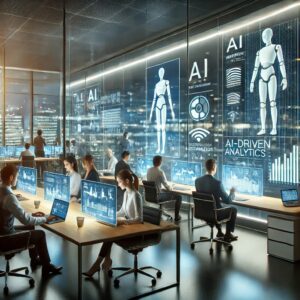Elon Musk’s Perspective on AI’s Data Dependence
In a recent statement, tech magnate Elon Musk voiced his concerns regarding the current state of artificial intelligence (AI), revealing that AI has already consumed all available human-produced data. This situation raises significant questions about the future of AI training and the implications of its reliance on synthetic data. As AI technology continues to evolve at an unprecedented pace, understanding these dynamics is crucial for both developers and users alike.
The Age of Data Consumption
Musk’s assertion highlights a pivotal moment in the development of AI. For many years, machine learning models have been trained on vast datasets collected from various sources, including social media interactions, online articles, and public databases. However, Musk argues that the well of human-generated data is nearly depleted. This depletion poses a challenge for AI systems that depend heavily on this information to learn and improve.
Once the available data is consumed, AI models face a critical juncture. They can no longer rely on real-world information for their training needs, pushing them into a realm where they must look for alternative means to enhance their capabilities. This brings us to a concerning trend: the reliance on synthetic data.
The Rise of Synthetic Data
Synthetic data is generated using algorithms rather than being collected from real-world scenarios. While this approach can offer several advantages, such as preserving privacy and generating specific scenarios that might be lacking in actual data, it also presents significant risks. One of the most pressing concerns is the potential for hallucinations—a term used in AI to describe instances when a model generates information that is incorrect, irrelevant, or wholly fabricated.
Musk’s comments have reignited discussions around the integrity of AI systems and their outputs. With synthetic data, the quality and reliability of AI models can suffer. The fear is that AI could produce misleading or false outputs, which can lead to an erosion of trust in these systems.
Implications for AI Development
The implications of Musk’s observations on the future of AI are profound. As businesses and developers navigate this evolving landscape, several key considerations emerge.
Quality versus Quantity
The transition from human-generated data to synthetic alternatives raises questions about the importance of quality over quantity. While data volume has typically been viewed as a primary determinant of an AI model’s success, the quality of that data is becoming increasingly significant. Developers must prioritize sourcing high-quality, diverse datasets, even if they are limited in number, to train robust AI systems.
Furthermore, the methodology behind generating synthetic data needs scrutiny. Not all synthetic data is created equal, and developers must ensure that the algorithms used to create this data do not perpetuate biases or inaccuracies.
Accountability and Ethics in AI
With the increasing reliance on synthetic data, issues of accountability and ethics in AI development must come to the forefront. Who is responsible when an AI system produces erroneous or harmful outputs? As developers turn to synthetic data to fill the gaps left by human-generated data, it becomes essential to implement frameworks that hold them accountable for the accuracy and ethical implications of their models.
Ethical considerations also extend to the creation of synthetic data itself. Developers must navigate the fine line between using synthetic data for innovation and ensuring that it does not contribute to misinformation or reinforce existing biases present in the algorithms.
Regulatory Considerations
As AI technology continues to mature, regulatory considerations will become increasingly vital. Musk’s comments signal the need for policymakers to step in and establish guidelines governing the use of AI and synthetic data. Regulations may help ensure that AI systems are transparent, reliable, and accountable, ultimately fostering a safer environment for users.
Such regulations could also encourage the development of best practices for synthetic data production, ensuring that it is used responsibly and ethically. By establishing these guidelines, lawmakers can help mitigate the risks associated with AI’s dependence on synthetic data.
Looking Ahead: The Future of AI
As we journey deeper into the realm of artificial intelligence, it is essential to remain vigilant about the evolving challenges presented by data consumption and the reliance on synthetic alternatives. Elon Musk’s warnings serve as a reminder that while AI has the potential to revolutionize industries and improve lives, it also requires careful consideration and responsible management.
The Role of Collaboration
The future of AI development will likely depend on collaboration among various stakeholders, including tech companies, researchers, policymakers, and ethicists. By working together, these groups can address the challenges posed by the depletion of human-generated data and the reliance on synthetic data.
Collaboration can foster a culture of innovation that prioritizes ethical considerations and encourages transparency in AI development. By sharing knowledge and establishing common best practices, stakeholders can create a framework for responsible AI development that benefits society at large.
Education and Awareness
Finally, education and awareness play integral roles in shaping the future of AI. As AI technology continues to permeate everyday life, it is crucial for users to understand the limitations and potential risks associated with these systems. By fostering a general understanding of AI, its capabilities, and its challenges, society can be better equipped to navigate the complexities of this technology.
In conclusion, Elon Musk’s remarks about AI’s consumption of human-produced data and the reliance on synthetic alternatives serve as a potent reminder of the challenges ahead. By prioritizing quality data, emphasizing ethical considerations, collaborating across sectors, and promoting education, we can ensure that the future of artificial intelligence is both innovative and responsible.



